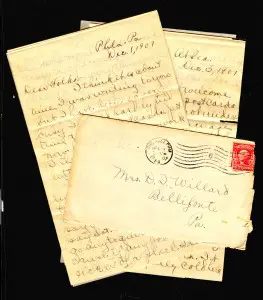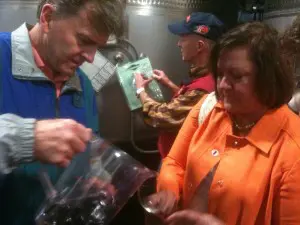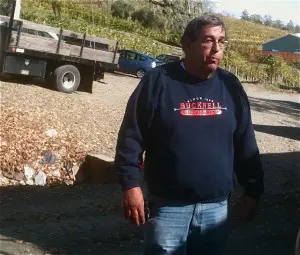Thank You, US Postal Service
January 25, 2015
The United States Postal Service gets a lot of grief these days. Derided as the delivery agent for ‘snail mail,’ they are criticized for being too expensive, too slow, outdated and time consuming in the era of instant communication.
Yes, I have tracked letters sent via ‘Priority Mail’ as they traveled to San Diego before reaching their intended destination 10 days later, two zip codes from my office. I can send a package to Hawaii (from San Francisco) in two days, but the same size box to Boston takes over a week.
And yes, grandma, I remember when a first class stamp was 5 cents. I now buy forever stamps in rolls of 100, so I don’t even know what first class postage is. (Great marketing, if you ask me.)
I can text my friends all over the country and within 10 minutes will have a response…any longer and I get impatient. Email, which we all thought was great a few years ago, is now too slow, since most people still have to check before responding.
I tweet to my followers, and most of my relatives have Facebook pages,so we’ll all know who’s doing what. I write this blog so everyone knows how I feel about what’s going on in the world.
But none of those methods can generate the emotions of a stamped letter. Neuroscientists now know that memories are more than just events. Our brains recall all five senses and any of them can spark a memory.
I was reminded of that this week, when a good friend, David Allen, sent me a batch of letters, found while cleaning out his mother-in-law’s attic.
They were written over 47 years ago when I was a freshman at Bucknell University in Lewisburg, PA. In fact, they were written in the first few months of college, when I was really still attached to my high school experience and scared to death about the future.
I remember the onion paper, the smell of the inked ribbon , and the old green and white Smith Corona that I used, to peck out letters to my parents, friends and former high school classmates. I still have the typewriter in fact – even had it reconditioned after I found it while going through my old homestead when my Dad died. I’m told it’s a collector’s item.
The letters were written to David’s wife, Betty, my best friend, and while we were never involved romantically, are filled with good natured banter that would pass for flirtation.
The actual content is really irrelevant: my observations about classes, social life, campus events, and gossip. It was 1967, and I know every campus was awash in protest and politics, but there’s none of that, so I doubt Oliver Stone will need them for some new 1960’s expose.
But for me, they are more important than any email, tweet or text I will ever send. When I re-read the words, and hold the letters, the memories of those years come flooding back. More importantly, I’m talking to my friend, Betty, again, even though she was struck down by cancer 12 years ago.
So, while I can find endless versions of various web pages, and can see the trail of my texts to friends and colleagues, none of them will ever hold the power of the printed word that I can pick up, hold in my hand, and still smell the memories from so many years ago.
For that I thank the US Postal Service and David, who was thoughtful enough to mail them back to me..
So, Why Does the World Exist?
May 10, 2013
I admit that I started reading Jim Holt’s “Why Does the World Exist?” as penance. Many years ago, Douglas Sturm, my political theory seminar leader at Bucknell University, tried to introduce me to Plato.
Seems I never had time for the deep thinking required and I almost flunked.
So when I saw Mr. Holt’s book on several 10-best lists last year, I decided to get it another try, for Professor Sturm.
I guess it took 43 years before my brain could wrap itself around the concepts but I’m glad Mr. Holt succeeded.
I would recommend this book for anyone who wants to spend some time contemplating our world’s oldest question, but particularly journalists who get caught up in the daily routine of facts, figures and political hyperbole.
Holt’s writing is erudite, easy to read and understand but filled with concepts that most of us never consider, or try to avoid.
At the same time, like any good journalist, he examines the question posed in his title from every conceivable angle. No just as a personal essay, but by interviewing leaders in the field and then explaining what they seem to be saying.
Others have called his book a “detective story” but, like his readers, who want concrete answers, he accepts or rejects various arguments along the way. He reaches his own conclusions, which we are free to accept, or not, and manages to humanize the whole effort with references to his own life and his experience with death.
The journey is interesting, entertaining and, if Professor Sturm is reading this, enlightening. I’m finally starting to understand some of what Plato was telling us. Thanks for whetting my appetite.
Bucknell Report
September 30, 2011
To download the Report:
The Campus Climate for Bucknell University Students: A Multifaceted Analysis
The president’s letter:
OpenLetteronCampus ClimateTaskForceReport
Comments are welcome.
What’s Important in Business
June 13, 2011
Recently I helped to host a career networking night for my Alma mater, Bucknell University. We do an event twice a year at interesting locations around the Bay Area and focus on career advice for alums.
Last week’s gathering was at The Bechtel Corporation, where Peter Dawson, (CFO) and his wife, – parents of a current student – sponsored the evening, featuring the Dean of the College of Engineering, Keith Buffinton as well as 1996 alum, Amy Klement.
Amy focused on her career path, at Paypal, EBay and now as Vice President, of Omidyar Network. To say her career has been on the fast track is an understatement. But after listening to her talk, it’s easy to see why she has been so successful.
She is human, genuine, honest and real – all qualities that are is short supply at most businesses today. She understands that her Emotional Intelligence has been the key. It’s also a point that most most people simply don’t get.
Every six months another book comes out about emotional intelligence, and, as Amy points out, executives claim that it is more important than traditional I.Q., but most businesses are still filled with executive who have very little of it.
I’ll leave a more complete explanation for later posts, but I think Amy’s 20 minute talk is worth listening to.
Orange and Blue Wine
November 11, 2010
Spent part of last weekend touring two wineries in Napa Valley with a bunch of other Bucknell University Alums.
Ed Farmer, a BU grad from 1969 showed us around the Kendall Jackson Oakville winery where they process grapes for a number of KJ’s brands. This is the Napa headquarters for the brand and Ed oversees 5 different vineyards and as well as the press/processing
operations. Well-known brands such as Freemark Abbey and Alisos Hills get their start here.
Ed, who holds a degree in civil engineering, keeps a watchful eye on all 30,000 barrels. It was great fun to taste barrel samples of a number of wines, although it was more like sampling lemonade in some cases.
It was also the last day of crush and they were hand-sorting some of the fruit that goes into their 0/bottle Cardinale brand. We didn’t get any samples of that, but there was some excellent cabernet, viognier, and merlot.
On the other end of the wine making scale was Reverie Winery on Diamond Mountain in Calistoga – owned and operated by Norm Kiken and his new bride.
Complete with wine cave and Redwood picnic area, Reverie makes about 3000 cases of highly respected wine, including a Roussanne which is not seen that often in California.
Norm is a 1968 graduate of Bucknell, but admits that he learned by the seat of his pants – moving from investment banking when he accidentally discovered he had a palate.
Norm’s wines have drawn high praise from critics and consumers alike and if you ever seen any if your local wine shop by a bottle or two and have a toast to one of Bucknell’s finest. And by all means try his special blend named for his son, Andrew Scott Kikken – that would be the A.S. Kiken brand.




